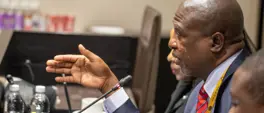Mother Earth Day: Africa's voice is missing from the climate conversation
Nica Richards
22 April 2023 | 10:00Africa needs to go back to its roots when it comes to the environment, and one way to do that is through implementing systemic changes, to give mother nature the rights she deserves.
JOHANNESBURG – The roots of Africa’s colonial history and subsequent resource exploitation run deep. But deeper still run indigenous traditions that aim to, among other values, have humans and nature co-exist harmoniously.
It is this step South Africa is missing when it comes to protecting the planet – and it will inevitably lead to humanity’s downfall.
READ:
-
Massive prehistoric fish discovered over 37 years by scientist in Makhanda
-
SA govt withdraws regulations aimed to protect endangered wildlife species
-
Coal is still king in SA, even amid a 'just' energy transition
The African voice in the conversation surrounding environmental issues such as climate change and species extinction has been disturbingly quiet.
But one environmental lawyer is working hard to change that, by pushing the Rights of Nature (RoN) ideal.
Cormac Cullinan, founder of NGOs Wild Law Institute and the Biodiversity Law Centre, explained that RoN is about changing legal systems to recognise that other beings, such as animals and the environment, are legal subjects, with rights, as opposed to current legislation which sees them as property.
It does not suit Africa to act like the “colonial overlords” that taught the world to view nature as something to benefit from by exploiting, Cullinan explains.
“The underlying understanding from African philosophies of humans living within nature are already there, but have been broken down by urbanisation, and Western outlooks. But I think at the root of this is the recognition that what is special about our planet is life. We are one life form. To protect life, we need to respect other beings; that they are beings and have rights.”
For RoN to be successful, a sincere mindset change is needed, in how we understand ourselves, and our toxic relationship with Earth.
“When everything is a commodity, those with the most money get what they want – but with a rights-based approach, you can’t buy someone else’s rights. We have to go to the root of the problem. Almost everything that causes climate change is legal but will kill us all if we carry on.”
And time is of the essence. The latest Climate Change Performance Index puts South Africa at 44th out of 59 countries – five places worse than the previous period.
Implementing the RoN may not be a short-term solution, but it will be a longer-lasting one.
“Government is divided on whether climate change is a problem or not. Most politicians focus on short-term issues because their time in office is short, and populism. But more than 70% of Africa’s wildlife has disappeared since the 1970s.
“We have lost our fundamental understanding that we are part of a community of life, and our future is tied to it.”
Cullinan said the RoN was the systemic kickstart humanity needed to protect what we continuously take advantage of, even if it seems like an idealistic plan.
“Our civilisation is not ecologically sustainable. RoN is a global movement aligned with the perspectives of indigenous people. The law should guide humans to be responsible members of the Earth community.”
Get the whole picture 💡
Take a look at the topic timeline for all related articles.














